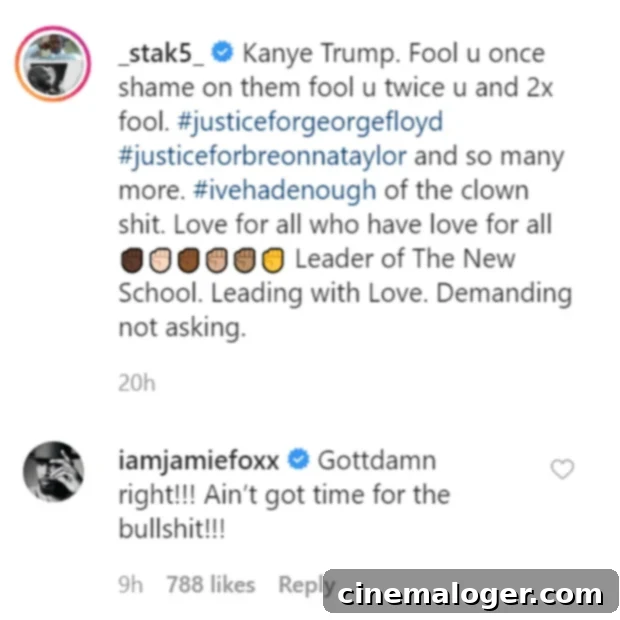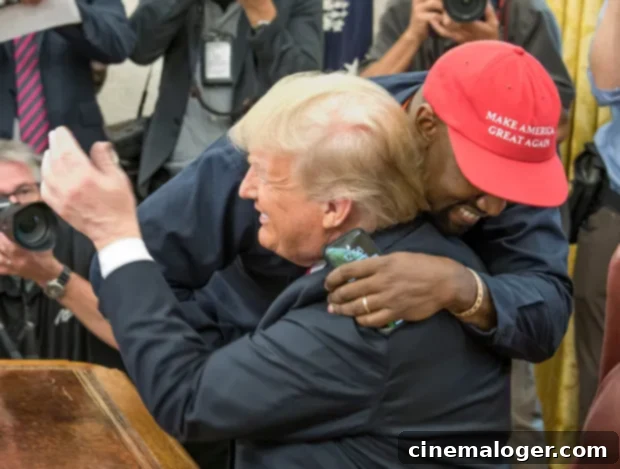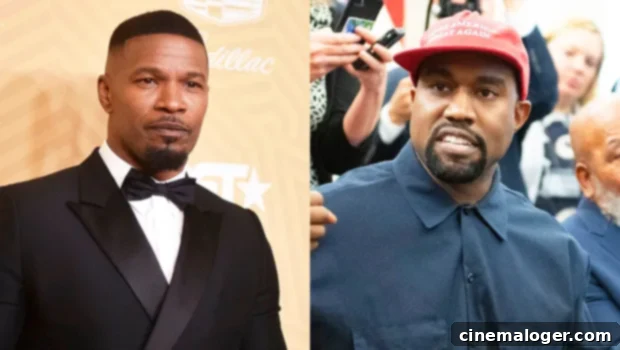Jamie Foxx Slams Kanye West’s 2020 Presidential Bid: A Deep Dive into Celebrity Politics and Public Reaction
The intersection of celebrity, politics, and social commentary often sparks intense debate, and few moments encapsulated this dynamic more vividly than Kanye West’s audacious declaration of his 2020 presidential candidacy on the Fourth of July. While West, a renowned musician and fashion mogul, has consistently courted controversy and public attention throughout his career, his political aspirations ignited a firestorm of reactions, particularly from fellow public figures. Among the most vocal critics was Academy Award-winning actor and entertainer Jamie Foxx, whose sharp disapproval underscored a broader sentiment regarding the seriousness and implications of celebrity-driven political campaigns.
On that pivotal Independence Day in 2020, Kanye West utilized his massive social media platform to announce, “We must now realize the promise of America by trusting God, unifying our vision and building our future. I am running for president of the United States! #2020VISION.” This unexpected tweet instantly became a global talking point, prompting a diverse range of responses from outright mockery to cautious support. However, for many, including prominent voices within the entertainment and activism spheres, the announcement felt less like a genuine political movement and more like a disruptive spectacle, particularly given the turbulent political climate and pressing social justice issues of the time.
Jamie Foxx, known for his versatile acting prowess and charismatic personality, wasted no time in making his feelings known. His reaction came in response to a powerful Instagram post by former NBA star Stephen Jackson, a close friend of the late George Floyd and a fervent advocate for the Black Lives Matter movement. Jackson’s post sharply criticized Kanye’s presidential bid, labeling it “clown sh-t.” This was not merely a dismissive comment; it was a deeply charged statement from someone actively engaged in the fight against racial injustice and police brutality, issues that had gripped the nation and sparked widespread protests.

Stephen Jackson’s post featured a controversial image of Kanye West, 43, embracing then-President Donald Trump, with West notably sporting a “Make America Great Again” (MAGA) hat. This image was a potent symbol of West’s previous alignment with Trump, an association that had already alienated many of his former fans and collaborators, especially within the Black community. Jackson’s caption further amplified his condemnation: “Kanye Trump. Fool u once shame on them fool u twice and 2x fool,” he wrote, alongside the crucial hashtags “#justiceforGeorgeFloyd” and “#justiceforBreonnaTaylor.” He powerfully emphasized the ongoing struggle against police misconduct, stating, “so many others” who have died at the hands of law enforcement. Jackson concluded his sentiment with “I’ve Had Enough of the clown sh-t. Love for all who have love for all. Leader of The New School. Leading with Love. Demanding not asking.”
It was within this context of raw emotion and political frustration that Jamie Foxx, 55, known for his roles in films like Just Mercy and his dynamic presence, weighed in with an unequivocal endorsement of Jackson’s stance. “Gottdamn right!!! Ain’t got time for the bullsh-t!!!,” Foxx commented, echoing the sentiment of disbelief and exasperation. Foxx’s concise yet powerful statement encapsulated the frustration of many who viewed West’s last-minute presidential bid as a distraction, or worse, a cynical move designed to draw attention away from critical issues and potentially impact the election in unforeseen ways. His choice of words, “ain’t got time for the bullsh-t,” highlighted a prevailing desire for serious engagement with the nation’s problems, rather than what was perceived as a celebrity stunt.
The concern about celebrity involvement in politics without substantial experience was further articulated in Stephen Jackson’s post through a tweet by DJ Hed. The tweet sharply questioned the logic of electing public figures based solely on their fame: “No more voting celebrities who’ve never held public office… If you wouldn’t hire a plumber to work on the electrical wiring in your house why would you vote this way? America’s obsession fame / celebrity is the endgame.” This analogy resonated with many who felt that the complexities of governing a nation required more than just name recognition or a large platform. It touched upon a fundamental skepticism towards political novice candidates, regardless of their public appeal. The argument posits that the skills and experience required for effective political leadership are distinct from those that lead to success in entertainment, and conflating the two could have detrimental consequences for the country.

Kanye West’s announcement, coming just months before the November 2020 election, immediately raised questions about its sincerity and feasibility. While his wife, Kim Kardashian, publicly endorsed his bid by resharing his tweet, the practicalities of launching a credible presidential campaign at such a late stage were daunting. Securing ballot access in all 50 states within the remaining timeframe would be an immense challenge, requiring significant organization, funding, and legal maneuvering. This logistical hurdle fueled suspicions that the campaign might be more of a publicity stunt, or perhaps an attempt to disrupt the existing political landscape rather than a serious quest for the presidency. The timing also led to speculation about its potential impact on the already contentious race between incumbent Donald Trump and Democratic challenger Joe Biden.
Despite the widespread negative reactions and skepticism, Kanye’s announcement did garner some notable support. Tech billionaire and Tesla founder Elon Musk quickly responded to West’s tweet, stating, “You have my full support.” This endorsement from another high-profile, often controversial figure added another layer to the narrative, suggesting that some influential individuals genuinely believed in West’s potential or, at least, his capacity to challenge the status quo. Similarly, Mark Cuban, the entrepreneur, Shark Tank star, and owner of the Dallas Mavericks, also expressed his support for a 2020 Kanye bid, particularly if it meant an alternative to the existing options. Cuban had previously shown an interest in political discourse and had been critical of aspects of the Trump administration, making his endorsement of West a complex signal about his desire for new leadership.

The entire episode served as a microcosm of the evolving role of celebrity in modern American politics. In an era where social media allows direct access to vast audiences, the line between entertainment and political influence has blurred considerably. While some argue that celebrities have a right, and perhaps even a duty, to use their platforms for political engagement, others contend that their fame can overshadow genuine policy discussions and lead to uninformed public discourse. Jamie Foxx’s decisive rejection of Kanye West’s presidential bid, amplified by the heartfelt activism of Stephen Jackson and the pragmatic concerns of DJ Hed, reflected a yearning among many for substance over spectacle in political leadership. It highlighted a growing impatience with what is perceived as trivialization of crucial national decisions and a demand for candidates who demonstrate proven commitment, experience, and a profound understanding of the challenges facing the nation.
Ultimately, Kanye West’s 2020 presidential campaign, despite its initial splash, struggled to gain significant traction, underscoring the formidable hurdles faced by independent, last-minute candidates. However, the reactions it provoked, particularly from figures like Jamie Foxx and Stephen Jackson, offered valuable insights into public sentiment during a particularly fraught period in American history. It showcased the deep divisions within society, the passionate advocacy for social justice, and the ongoing debate about who is qualified to lead the country. The “clown sh-t” label, while harsh, captured a frustration with perceived political grandstanding at a time when communities were grappling with profound grief, injustice, and uncertainty. This incident remains a potent reminder of how celebrity, politics, and social activism continue to intertwine in complex and often controversial ways, shaping public discourse and the very fabric of democratic engagement.
